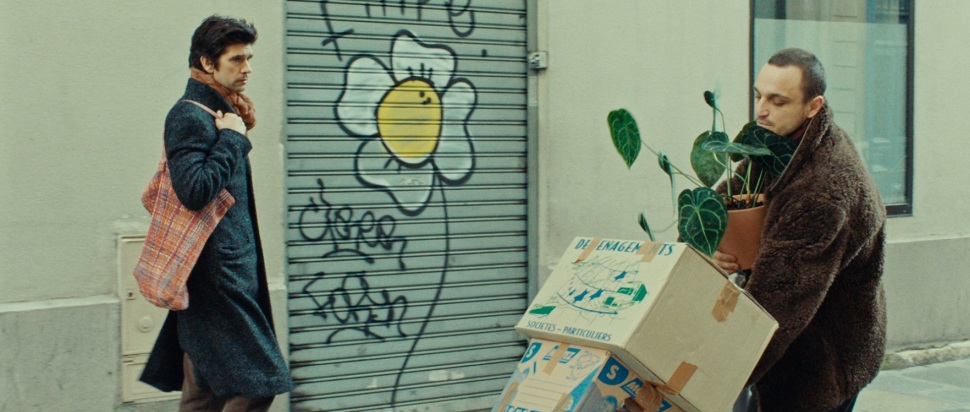Ira Sachs on Passages
With Passages, Ira Sachs gives us a brutally honest drama about romantic desire centred on a married filmmaker who embarks on an extramarital relationship. Sachs tells us why he wanted to put an incredibly sensual love triangle on screen
Ira Sachs reckons he has only cried in three cities: New York, Memphis and Paris. “There's only a few where I've had enough depth of experience,” he says. Paris is the backdrop for the acclaimed director’s latest film, Passages, which follows filmmaker Tomas (Franz Rogowski), who is married to artist Martin (Ben Whishaw) but begins a fling that turns into something more when he meets Agathe (Adèle Exarchopoulos) at his film’s wrap party. “Paris is a city I've known well for the last 30 years,” Sachs says. “I've made a life there. I've had relationships there. I've had breakups there. I've had sex there. I’ve cried there. There is a familiarity that feels very organic.”
The film’s location, bilingual dialogue, and artistic milieu support Sachs’ brand of emotional realism, which draws from worlds where “valuable memories” are not hard to access. “I tend to choose careers for my characters that I think I can get right,” he says. “It would be hard for me to imagine the life of a realtor, for example, or a journalist, because I haven't been inside that world. I'm always trying to find things where I might get the details right. Films are made up of details. My job is to present as many that are relevant and rich, in a way that creates a world that the audience can enter.”
Details, however, do not mean entire histories. Passages opens with no introduction to characters or relationships, but the unfolding picture is so sharp that they quickly become known. “It's important that Passages be made up of a series of authentic moments that give you a sense of a larger world and a greater history, but not every detail,” Sachs says. “A strategy I've had throughout my career is to think of each scene as a middle. This creates a collage of moments which add up to a whole. The challenge is to give the audience enough that they feel satisfied but not too much that I'm reducing the content.”
He continues: “Imagination creates an attachment and intimacy between audience and image” – as in a painting. “I want you to feel that things get more complicated as you go along, and that any character could be one you follow,” he adds, citing Robert Altman’s democratic directorial approach. “The real estate you have is so limited that everything is valuable.”
The complicated affairs at the heart of the film unfold in extreme naturalism. Many emotionally charged scenes are shot from one fixed point, with one character blocking the other. “I position the camera in the privileged position of being in the room, but not intruding,” Sachs says. “Sometimes the intimacy excludes the audience in a way that, in my mind, creates more attachment. It's more authentic. You are literally the voyeur. You're lucky to be there, but they're not doing it for you.”
Tomas is fascinating to watch, even root for, but hard to love. Sachs and Rogowski watched James Cagney – one of 1930s Hollywood’s most lovable rogues – for inspiration. “Cagney gave Franz the permission he needed to enjoy the character fully without fear,” says Sachs. “Franz is such a lovely person and that comes through underneath. You're watching Tomas but you're also watching Franz play Tomas. That creates a cinematic personality which draws the audience close. He's a very charismatic person who is really great to look at and can carry off the kind of wardrobe that most of us couldn't imagine wearing. That takes a great confidence, and the confidence is attractive.” Many people may try to pull off Tomas’ signature mesh shirt, but few will succeed with Rogowski’s aplomb.
Sachs knew Whishaw from Paddington but two other performances stuck with him: Todd Haynes’ I’m Not There and The Crucible on Broadway. “Ben is a very modest person who becomes like a knife when he acts,” says Sachs. “He's so sharp, and he's so exact. It's almost scary. But I think that potential power is integral to his charisma.”
Passages is rated 18 by the BBFC and has faced the MPAA’s dreaded NC-17 rating in the United States, which severely limits its marketing and distribution there. To Sachs, the BBFAC and the MPAA’s aim is discipline, not support of art. “What concerns me is not my own film but the violence signalled to other filmmakers that certain kinds of images won't be allowed,” he explains of this censorship. “It has a commercial impact but also a human impact. That trickles down to tell people that their lives aren't acceptable as gay people and these kinds of images will be punished.”
Sachs sees these censorship boards as anathema to culture and humanity. “It's defining what culture is allowed,” he says. “We're not bigger than the culture we’re a part of. I have to go back and look at movies made in the 1970s and 1980s to remember what's allowed.” In the age of streaming impermanence, this collective history is a great argument for film preservation, archival, and exhibition. “You show people certain images, and they go, ‘I can shoot that?’ And the answer is, ‘Yes’.”
Passages is released 1 Sep by MUBI; certificate 18
